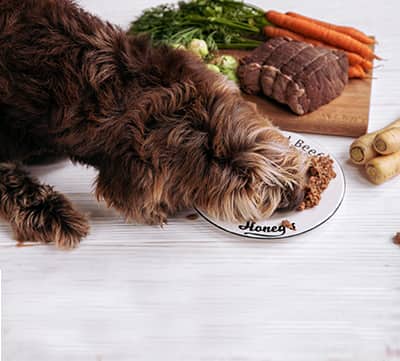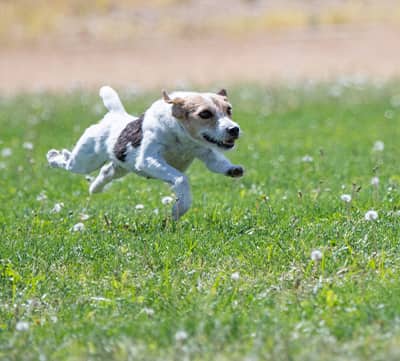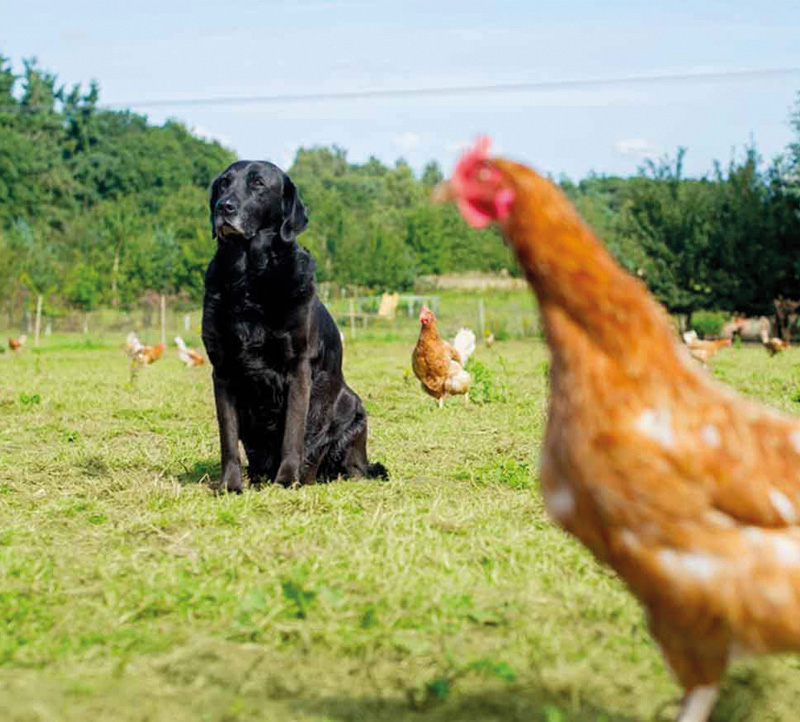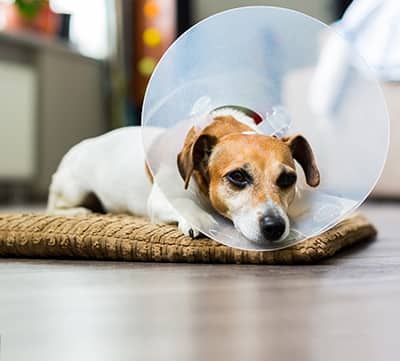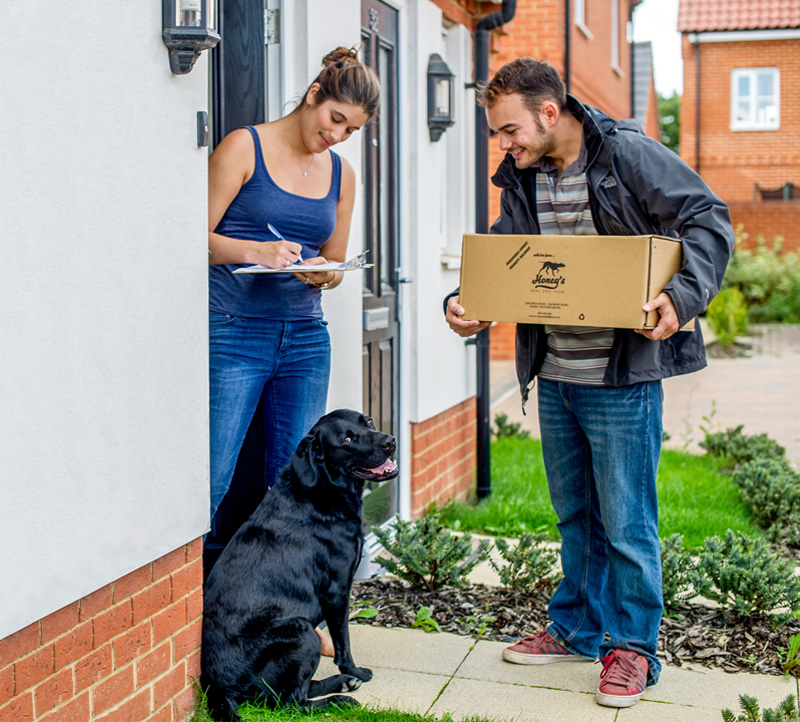Raw feeding and conditions relating to dogs digestive systems
This article covers:
- Bloat or gastric torsion
- Colitis
- Coprophagia (eating faeces)
- Constipation
- Diarrhoea
- Flatulence
- Inflammatory bowel disease
- Irritable bowel syndrome
- Vomiting
- Prebiotics and probiotics
Mostly raw
With one or two exceptions (primarily where the dog’s immune system has been compromised), you will see that a raw food diet is always recommended. This is because raw food is the easiest thing for your dog to digest and supports his or her immune system.
Where raw feeding isn’t recommended, you should not revert to processed food but simply cook the ingredients in the way prescribed. Processed food is an underlying cause for as many as 9 out of 10 visits to the vet, and this includes expensive, so-called scientifically developed, brands.
A reminder about water
Water is treated with a great number of chemicals. Ill dogs are less tolerant of these chemicals, and so it is advisable to find a source of pure, clean water.
This could be a mineral water (better from a glass bottle than plastic as plastic bottles left in the sun alter the chemical composition of their contents), rainwater or filtered water.
Why ill dogs do better on organic food
Intensively reared meat and intensively farmed vegetables, especially those imported from outside Europe, are often grown without the regulatory framework we are used to, and may contain a surprisingly high percentage of unnatural chemicals (everything from growth hormones to nitrates and from steroids to pesticides).
Furthermore, meat will include the residue of whatever the animal has been fed.
This is particularly relevant in the case of grain-fed livestock and poultry, and grain is especially harmful to dogs. It is better, therefore, to feed organic food to ill dogs.
Free dietary advice
If you need dietary advice, don’t forget it is available, free of charge and without obligation, from Honey’s Real Dog Food.
Conditions relating to the digestive system
Bloat or gastric torsion
Since the 1980s, the incidence of bloat (also known as gastric torsion, gastric dilatation-volvulus, or GDV) has increased dramatically. In this condition the stomach twists or flips over on itself and air is trapped. Then any food in the stomach begins to ferment, creating further gases. Later on, circulation to the stomach and spleen are cut off to the point where the dog may go into shock and die.
It seems to affect mature, deep-chested dogs the most, especially larger breeds. The condition is extremely serious and potentially fatal. If you suspect bloat, contact your vet immediately.
For a dog that has suffered and survived bloat, a dry food or kibble diet is definitely not to be recommended. Instead, switch the dog to a raw food diet, which has been shown to improve the chances of preventing a recurrence. After bloat, many dogs lose weight and it is important to get this back on as soon as possible, since a healthy weight is one of the factors that reduce risk. Having said this, too much fat in the diet can be harmful. Instead, use lean meat and increase the frequency of meals and total volume of food served.
One of the best things to give dogs that have suffered bloat is green tripe. Avoid vegetables as the fermentation process can produce gas.
It is still not entirely clear why so many dogs appear to be getting bloat. One theory is that dry food is the cause. Most cases seem to occur quite late at night (between 9 p.m. and 2 a.m.) and should always be treated as an emergency.
Bloat may be related to stress of some type. Interestingly, dogs that appear to be happy are much less prone to this condition.
Colitis
Colitis is either acute or chronic inflammation of the colon and the symptoms aren’t terribly pleasant. In acute cases expect vomiting, with diarrhoea containing mucous and blood. In chronic cases the dog will frequently try to pass watery, blood-streaked, mucous and putrid stools. The dog may suffer from flatulence and vomiting. There may be weight loss over time.
Do not panic if your vet diagnoses colitis, as it is the cause of around half the cases of diarrhoea in dogs and is relatively common and very treatable.
What causes it?
Generally speaking, it is the result of eating something unsuitable (perhaps picked up while on a walk), food intolerances or allergies. Other causes can include infection•or parasites. Some cases may be stress-related, and there is a possibility of an autoimmune cause.
In terms of treatment there is every reason to continue raw feeding since this is the easiest food for your dog to digest. If there is the possibility of a compromised immune system, lightly cook the meat before serving.
Avoid gluten (grains) and dairy products. Use both a prebiotic and a probiotic. A period of fasting may be appropriate.
Constipation
Constipation can occur if a dog becomes dehydrated or has too much bone in his or her diet without sufficient fibre. Other rare causes can be too little magnesium and/or too much aluminium in the dog’s diet and also nerve degeneration.
One of the benefits of a natural diet is that your dog is less likely to become constipated, but if it does become a problem then add more soluble fibre (ripe apple, pears or tinned sardines or pilchards), while cutting back on the bone element. Reduce the number of chicken wings given, if relevant.
Incorporating liver or offal into the diet once or twice a week can help.
Coprophagia (eating faeces)
Human beings may find coprophagia (the medical term for eating excrement) disgusting, but to a dog it is a perfectly normal part of their diet. It is believed to have various causes:
- The artificial flavouring and appetite stimulants in processed food frequently pass straight through the digestive system without being absorbed into the body. As a result this can give dog (and cat) faeces a very attractive flavour. It is worth noting that dogs fed pineapple sometimes produce less appealing excrement.
- Boredom! This is especially true in the case of younger dogs and those in kennels who may not have enough to occupy them. Regular exercise, companionship and a selection of toys may help.
- A mineral or trace element may be lacking from the diet. Adding offal (liver or kidney) to the dog’s diet may provide the missing nutrients. A broad-spectrum supplement for trace minerals such as Dorwest Keeper’s Mix may also be of value.
- The intestinal flora may be out of balance, possibly as a result of a course of antibiotics. This is especially true if dogs are eating bovine and equine faeces (cow and horse poo, in plain English). A course of prebiotics and probiotics is recommended.
- Submissive behaviour within a pack. Less senior members of a pack will eat the Alpha dog’s faeces as an ingratiating behaviour. This is a harder problem to solve. A homeopathic remedy may be of great assistance.
Coprophagia can also lead to worms. Worms can also lead to coprophagia. Therefore, treatment against worms is advisable.
Diarrhoea
There is a huge difference between soft or runny stools and diarrhoea.
There is rarely any need to be concerned about soft or runny stools. Diarrhoea, when switching to a raw diet, is also not uncommon for the first few days.
True diarrhoea is virtually liquid (like soup) and movements are frequent. There are lots of different reasons for diarrhoea, including:
- bacterial infection such as salmonella, E. coli, clostridia and campylobacter
- fungal infection
- viral infection such as parvovirus, distemper and coronavirus
- yeast infection such as Candida albicans
- parasites such as worms, coccidia and protozoa
- poison
- tumours
- stress
- malabsorption syndromes.
It is obviously important to establish the cause before treatment can be recommended, and to this end it may be necessary to run blood and/or faeces tests. Depending on the seriousness of the condition, the options are to (a) do nothing, (b) fast the dog for 24 hours and (c) ask your vet for advice.
If it continues for more than 24 hours you should consult a vet.
Tips for dealing with runny stools and diarrhoea:
- Feed a natural diet and plenty of pure, clean water.
- Give some prebiotics (see below) to feed the good bacteria in the stomach.
- Use a probiotic (but ideally not live yoghurt). See below for details.
- Try to avoid antibiotics, steroids and anti-inflammatory drugs unless the dog is seriously ill.
- Try slippery elm or a modest amount of brewer’s yeast to aid digestion.
- Psyllium husk can be added to thicken the stools.
- Try a remedy such as Ferrum phosphoricum 12x or 6x tissue salt to help slow the diarrhoea and increase absorption.
Please note that gluten, cereals, cereal by-products and modified starch all contribute to canine digestive problems.
Flatulence
All dogs, regardless of their diet, are likely to have a certain amount of flatulence. The most frequent cause is the carbohydrates in processed food – easily remedied by a switch to natural feeding. Antibiotics may also be responsible, in which case a course of probiotics will often help.
A small percentage of dogs produce wind as a result of eating vegetables, or particular vegetables, and this can be dealt with by reducing the percentage of vegetables being served or excluding them completely. Incorporating more chicken wings in the diet can help, and so can adding a human-grade organic bone meal supplement.
Inflammatory bowel disease · IBD
IBD is a relatively new condition in dogs and similar to Crohn’s disease in humans. It is a chronic inflammatory intestinal disease that can occur anywhere in the digestive tract, but most commonly involves the small intestine and colon.
IBD – what should you watch out for?
- Recurrent bouts of diarrhoea, that is sometimes watery, explosive, odd-coloured (yellowish), mucous-coated, slimy and often has blood streaks.
- Vomiting (sometimes blood-tinged) is not unusual and the dog may have abdominal pain with distension to the bowel and abdomen.
- The stomach may emit gurgling noises.
- Dogs are often lethargic with weight loss and may have an increase or loss of appetite.
As these symptoms are similar to other conditions it can be difficult to make a positive diagnosis.
In terms of treatment there is every reason to continue raw feeding, since this is the easiest food for your dog to digest. However, reduce the fat content, avoid all grains and dairy products and increase the amount of fibre, such as psyllium husk. Slippery elm can help, too. Use both a prebiotic and a probiotic.
Irritable bowel syndrome · IBS
IBS is difficult to diagnose because so many of the symptoms, which may be intermittent, are shared with other conditions. You should watch out for intermittent bouts of diarrhoea or soft stools, increased frequency of defecation, small stools, straining to defecate, abdominal distension (bloating), flatulence, weight loss and, sometimes, vomiting. The stomach may emit gurgling noises. It is believed that diet and stress are the main causes, with some drugs aggravating an already sensitive digestive system.
In terms of treatment there is every reason to continue raw feeding since this is the easiest food for your dog to digest. If there is the possibility of a compromised immune system then lightly cook the food before serving. Avoid gluten (grains) and dairy products. Use both a prebiotic and a probiotic. Slippery elm can be a great help.
Vomiting
It is important to remember that dogs regularly regurgitate their food, and this process should not be confused with vomiting that is due to a potential or underlying health issue. If a dog vomits repeatedly and/or seems unwell in other ways then it warrants contacting a vet.
However, if the dog isn’t vomiting repeatedly and has no other apparent symptoms, you may like to start by fasting him or her for 24 hours, ensuring that there is an ample supply of pure, clean water available throughout. If your dog seems to be over drinking or having trouble keeping water down then give him or her a block of ice, which will thaw slowly ensuring a constant but reduced supply of water.
Assuming the dog has stopped vomiting after 24 hours, offer a small, light meal. This can consist of scrambled egg or cooked chicken with a prebiotic and a probiotic. If vomiting doesn’t reoccur then towards the end of the second day serve a smaller-than-usual meal of whatever the dog normally eats. Resume your ordinary schedule of feeding on day three. Note: If vomiting continues or is constant or if it contains blood or if it is in tandem with diarrhoea, consult your vet immediately.
Prebiotics and probiotics
Dogs, like human beings, have bacteria living in their gut. The bacteria themselves are made up of ‘unfriendly’ strains that can make the dog ill and ‘friendly’ strains that keep it well. Normally, the balance is in favour of the ‘friendly’ bacteria, but sometimes – such as after a course of antibiotics, during stress or through poor diet – the ‘unfriendly’ bacteria get the upper hand.
This is called intestinal dysbiosis, a bacterial imbalance that results in an overgrowth of bad bacteria and yeast. Dysbiosis has been linked to various disorders, including yeast infections, irritable bowel syndrome and rheumatoid arthritis. It is treated by restoring the balance with prebiotics, probiotics and a healthy (natural) diet.
Probiotics are beneficial bacteria that can be found in various foods. When you eat probiotics, you will add these healthy bacteria to your intestinal tract. Common strains include the Lactobacillus and Bifidobacterium families of bacteria. Prebiotics, on the other hand, are non-digestible foods that make their way through our digestive system and help good bacteria grow and flourish. Prebiotics keep beneficial bacteria healthy.
Happily, you don’t need to buy special canine prebiotics or probiotics, as those designed for humans work perfectly. If you need a prebiotic, try aloe vera or chicory. If you need a probiotic, try one containing Lactobacillus, Acidophilus and/or Bifidus-type bacteria with FOS (fructooligosaccharides). Use the minimum recommended human dose.
For more info and advice on any aspect of canine health and nutrition please get in touch…
Email: info@honeysrealdogfood.com
Call: 01672 620 260


